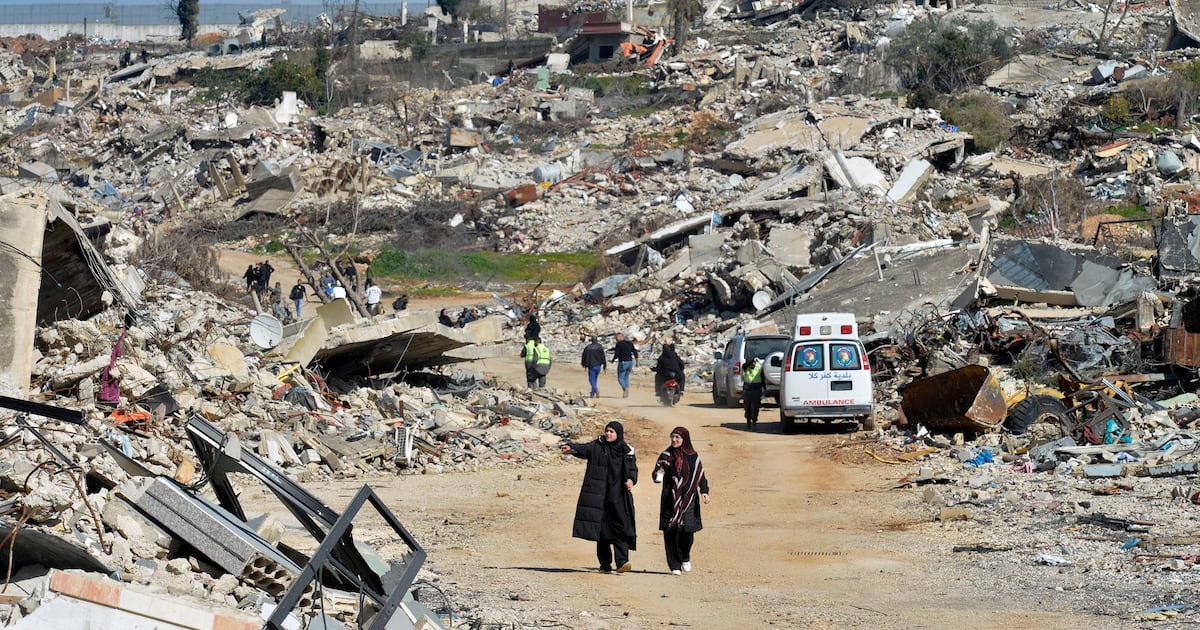Israeli soldiers kidnapped two Syrian agricultural workers when they raided houses in a southern Lebanon border area at dawn on Wednesday, as US special envoy Tom Barrack wrapped up a high-stakes diplomatic visit to Beirut focused on Hezbollah’s disarmament.
About 20 Israeli troops stormed the border area near the town of Mari, interrogated several people and searched houses, some inhabited, others not, Lebanon’s state news agency reported.
The Israeli soldiers captured the two Syrians, who were working in the area, taking them as they retreated. The Syrians were later released near the border. The Israeli army did not initially comment on the raid.
Al Mari Plain is an agricultural area near the Blue Line that separates Israel and Lebanon. In January, the Israeli army kidnapped two beekeepers from the plain and later released them.
Israel continues to occupy five military posts along the southern border despite being required to withdraw under the terms of a ceasefire deal with Hezbollah that came into force in November.
The Israeli army regularly carries out ground raids in pursuit of alleged Hezbollah infrastructure. A number of brigades pressed further into southern Lebanon this month and destroyed underground networks and weapons allegedly belonging to the armed group.
Last week, Israel carried out a major aerial bombing campaign on the Bekaa Valley, killing 12 people including seven Syrian refugees.
The Israeli army claimed it was destroying training centres operated by Hezbollah’s elite Radwan Force.
Hezbollah was severely weakened during a year-long war with Israel that ended with a ceasefire in November. Israel’s military campaign destroyed much of the group’s infrastructure and killed its leaders and senior commanders. Israel continues to bomb southern Lebanon almost daily.
Under the terms of the ceasefire, Hezbollah must pull all military equipment and fighters out of southern Lebanon, and all non-state militant groups must be disarmed across the country. Israel was supposed to withdraw and cease its attacks. Lebanon has accused Israel of breaching the ceasefire terms about 4,000 times.
Lebanon is under pressure externally and internally to disarm these groups, including Hezbollah and Palestinian factions that have a presence in the country.
Mr Barrack arrived in Beirut on Sunday for discussions on the disarmament of Hezbollah, a previously taboo topic.
Mr Barrack reiterated Washington’s position that there would be no halt to Israeli army operations – nor economic or political support for Lebanon – unless the authorities take tangible steps toward disarming Hezbollah, according to Lebanese sources familiar with the talks.
The sources said the message places the Lebanese government before a set of difficult choices.
Hezbollah Secretary General Naim Qassem said last week that the group would not surrender its weapons.
“Israel will not take our weapons away from us,” he said in a video message, adding that Hezbollah was ready to “confront the enemy”.
“We know that confrontation will be very costly, but submission would leave us with nothing,” he added.
While many observers believe his rhetoric is aimed primarily at Hezbollah’s domestic support base, the group has previously indicated it may consider a discussion on disarmament – but only if Israel stops breaching the ceasefire agreement.
Hezbollah is still believed to possess medium and long-range missiles, and it continues to command a broad Shiite support base.
Lebanon and the US have been exchanging proposals that could eventually lead to the group’s disarmament, with all weapons brought under the control of the Lebanese state.
In his most recent visit, Mr Barrack said that Washington cannot force Israeli decisions but can only try to influence them. He also stressed that disarming Hezbollah is ultimately a Lebanese matter, but said pushing for reform in the country was vital and the US wanted it to prosper.
Speaking on Wednesday, Mr Barrack acknowledged that disarming the group was a “complex process”.
“We are trying to act as an honest mediator to resolve disputes, and dialogue will continue with those who are still absent from the negotiating table. I will come back,” he said after meeting with Maronite Patriarch Bechara Rai in Bkerke.
“The process is ongoing, but it is up to the government to decide on its priorities. We need a clear decision and apply the gun monopoly law to limit the possession of weapons and put an end to aggression,” he added.
